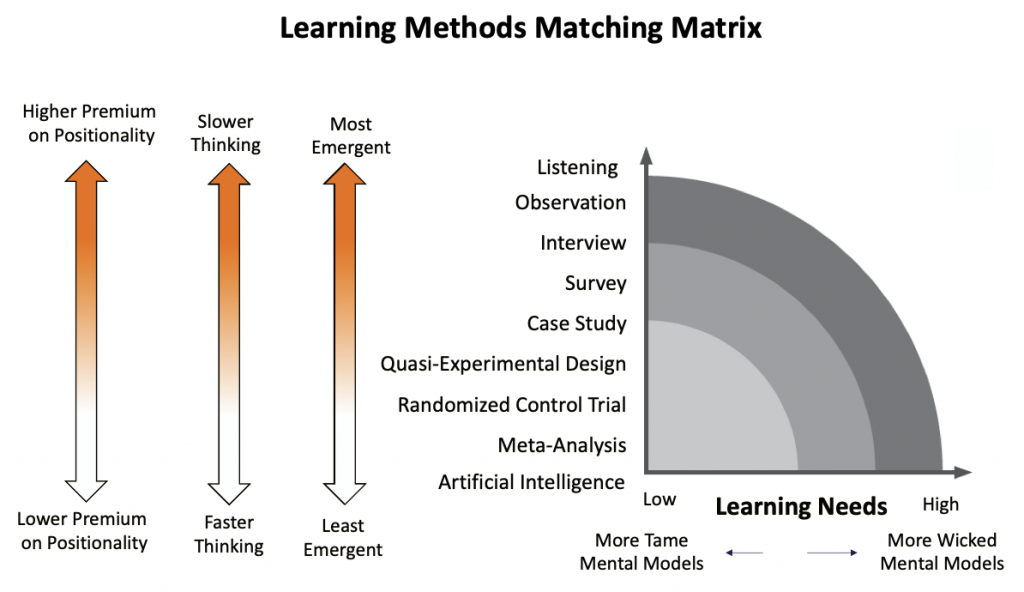Positionality is a relatively new term for me but, apparently, I have lots of it. I’m Carlos Romero from Apex in Albuquerque. Our evaluation portfolio focuses on equity work– education, health, food, and housing programs. I’m Latino. Gay. And, growing up, my family was on the wrong side of many social determinants of health. So, I’ve become a person of interest in the equitable evaluation movement. Today, I’ll share ideas from a presentation on BIPOC positionality which is also relevant to my positionality as a gay evaluator. When it comes to equity and diversity in evaluation, I believe the trajectory is right, but the pace and intensity are insufficient. What can be done?
First, a distinction. Positionality is different and more than diversity in the workforce. Activating it requires intentionality and, if the value proposition isn’t clear, positionality becomes performative. Edgar Villanueva says it best: “Those most excluded and exploited by today’s broken system possess exactly the perspective and wisdom needed to fix it. That’s us! It’s what BIPOC, LGBT, and evaluators from marginalized backgrounds have in common. We know what it’s like. We have perspective and wisdom. And, because we are still connected to those communities, we can help bring their voices to the evaluation learning table, too. Here’s a few ideas to accelerate pace and intensity around positionality to address wicked problems like health disparities, poverty, racism, and discrimination.
Mission
“Equitable Evaluation is using evaluation as a tool for advancing equity and involves diversity of teams, cultural appropriateness and validity of methods, revealing drivers of inequity, empowering those more affected to shape and own how evaluation happens.”
The Center for Evaluation Innovation describes the characteristics of equitable evaluation. It is a compelling vision that encompasses LGBT issues. But a vision requires an effective mission. One that is:
- Actionable – it tells you what to do;
- Clear and simple – unambiguous and easy;
- Repeatable – but iterative and emergent; and
- Universal – everyone can do it together.
I believe Systems Learning meets these criteria, but one way or another, we need something that produces emergent learning. These missional attributes are also qualities of a good game, and every good game involves an economy to tell us what’s important and incentivize the outcome. I contend that that the current economy of evaluation is incongruent with the outcome of learning. Which brings us to methods.
Methods
Consider these two illustrations. The first shows how method choices should correspond to the condition of knowledge. It’s meant to be cautionary, but the imagery reinforces false and persistent notions about validity and rigor. It perpetuates the idea that “highest” methods are best – and reinforces their standing as the most desirable and valuable in the market.

In my version, notice when the focus shifts from knowledge to learning. It’s a more appropriate orientation for wicked problems, and now methods depict meaningful hierarchies that change how we think about, choose, and value methods – positively disrupting the supply and demand dynamic of evaluation.

Motivations. We need a new game where both practice and business models of evaluation are aligned and optimized for learning – where positionality and methods are properly valued. Here’s what’s holding us back:
- Every system is getting the results it was designed to get…for someone.
- Power is the ability to change the rules of the game…or not.
I’ll end with encouragement from Villanueva – an appeal to the purchasers and purveyors to reflect on their motivations and consider changing the game of evaluation.
“What if we could be unencumbered by “the way it’s done” and liberated to design ourselves from scratch?”
The American Evaluation Association is hosting LGBT Issues TIG Week with our colleagues in the Lesbian, Gay, Bisexual & Transgender Issues Topical Interest Group. The contributions all this week to AEA365 come from our LGBT TIG members. Do you have questions, concerns, kudos, or content to extend this AEA365 contribution? Please add them in the comments section for this post on the AEA365 webpage so that we may enrich our community of practice. Would you like to submit an AEA365 Tip? Please send a note of interest to AEA365@eval.org. AEA365 is sponsored by the American Evaluation Association and provides a Tip-a-Day by and for evaluators. The views and opinions expressed on the AEA365 blog are solely those of the original authors and other contributors. These views and opinions do not necessarily represent those of the American Evaluation Association, and/or any/all contributors to this site.
